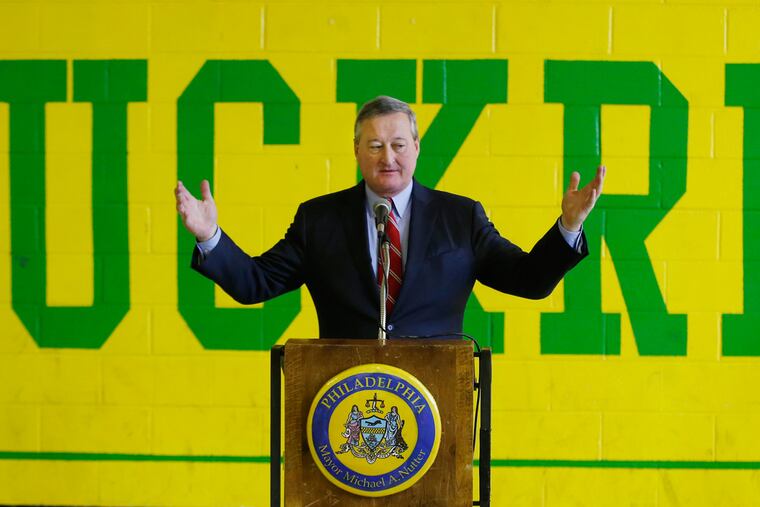City leaders picture full-service schools
Speaking with one voice Monday, the city's education leaders said Philadelphia School District buildings ought to be crowded with essentials for urban children and their families: social services, health care, job training.

Speaking with one voice Monday, the city's education leaders said Philadelphia School District buildings ought to be crowded with essentials for urban children and their families: social services, health care, job training.
Actually, Council President Darrell L. Clarke said, that sort of full service is already happening. In Philadelphia's jails.
"You can't tell me that we can deliver these services in a prison and we can't deliver them in schools," Clarke said.
Fresh off a school-visiting trip to Cincinnati, Clarke, Mayor-elect Jim Kenney, and others underscored that political support for "community schools" has coalesced, and that the model is headed for Philadelphia - fast.
Community schools concentrate social services and other supports inside school buildings, allowing educators to focus more on instruction by removing students' barriers to learning. The model counts on nonprofits, businesses, and universities to cover most of the costs of the services. In Philadelphia, a number of city resources would also be repurposed inside district schools.
Kenney has pledged 25 community schools in four years.
"We will be moving this along as soon as possible," said Clarke, speaking at a news conference inside the gym of Duckrey Elementary, a North Philadelphia school threatened with closure in 2013 and given new life with a strong principal and community partnerships.
Both Clarke and Kenney spoke glowingly of their trip to Cincinnati, considered by education experts to have the strongest community schools in the United States.
"We saw so many things that shocked us," Kenney said - inside one school, a dental clinic, a dedicated area for the school's 400 tutors, an eye center where children got exams, and glasses free of charge and on site.
"I never get impressed," Clarke said. "I said, 'Jim, can you believe this? In a school?' "
State funding will remain crucial, Kenney said, but community schools are a way to improve the city's ailing educational system without relying on a source of money that has historically been unreliable.
"We can do this if we stop complaining about not being able to do it," Kenney said. "If we can build two mega-facilities to house sports teams, we can take care of these kids."
Notable was the presence of top district officials - both School Reform Commission Chair Marjorie Neff and Superintendent William R. Hite Jr. spoke at the news conference, praising efforts that would allow them to better address children's needs with more resources. Their voices have not been as prominent in the community schools discussion.
Clarke joked that he and Hite "used to fight, but we don't fight anymore about the School District budget."
"There's no naysayers here," Kenney said.
Some charter proponents have expressed concerns that the community schools conversation appears to involve only district schools. Kenney did nothing to change that perception Monday, saying his focus would be district schools, which have not gotten enough support.
"This model can apply to any school, but we have a responsibility to take care of our public schools," he said.
Mark Gleason, executive director of the Philadelphia School Partnership, an organization founded to raise millions to expand strong charter, district, and Catholic schools, said the model already exists in some form in a few charter schools.
He said he worries that a new administration's push to implement its own priority will wipe away momentum for the city's existing early-literacy campaign.
Gleason also cast doubt on the academic benefits of community schools.
"There's not evidence that we're going to automatically see academic gains because we're bringing these community schools in," he said.
Still, the message from city leaders was clear. Otis Hackney, current principal of South Philadelphia High and Kenney's pick for chief education officer, in part because he has led a community schools-like model himself, said people across the city will benefit from what's coming.
"When we can put these resources together because we have the political will," Hackney said, "we can transform schools."
215-854-5146@newskag